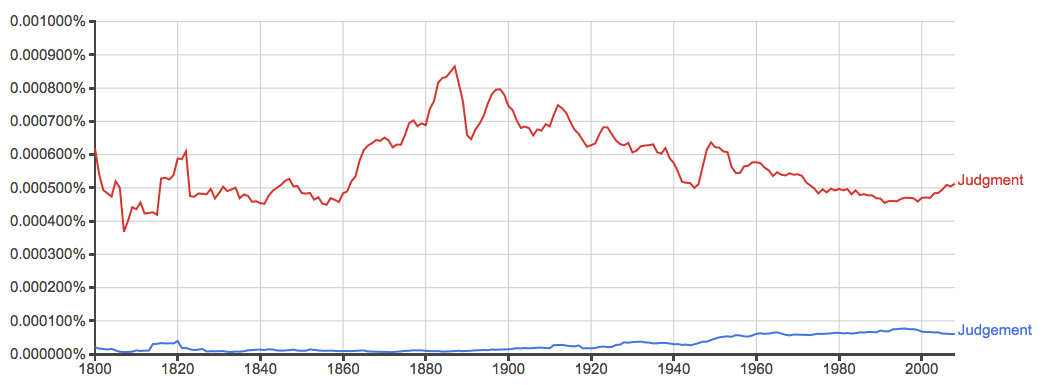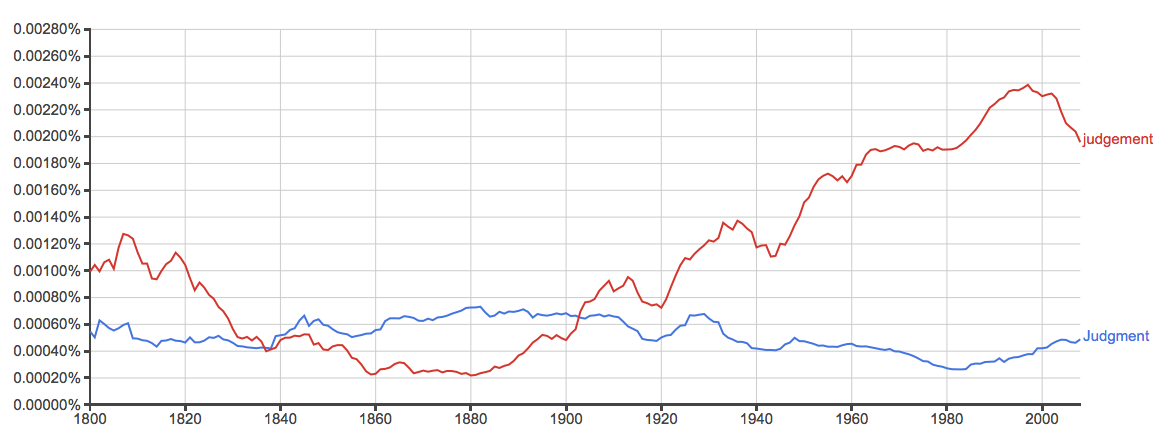The words judgment and judgement can cause a bit of confusion and unease in people’s writing because not many of writers are sure when to use which one. Are they just variants of the same word? Do they have different meanings or different functions within a sentence? Which spelling is correct?
In today’s post, I want to address all of these questions so that you will never again have to second-guess yourself while writing either of these words. So, what is the difference between judgement vs. judgment?
What’s the Difference Between Judgment, Judgement?
 Judgment and judgement are both nouns and they have a few different definitions. A judgment or judgement can be the formation of an opinion, the mental ability to perceive or discern, or a legal determination from a court of law. For example,
Judgment and judgement are both nouns and they have a few different definitions. A judgment or judgement can be the formation of an opinion, the mental ability to perceive or discern, or a legal determination from a court of law. For example,
- The judgment from the referee was that the touchdown stands.
- I’m not so sure about Joe; his judgement doesn’t seem very good.
- The criminal awaited his judgment from the court.
- Your judgement of market trends is impressive.
You’re probably still wondering, “Okay, when do I know which one to use?”
The answer to that question is that the difference between the words is entirely dialectal. There is no demonstrable difference of sense or function between them, meaning both words can be used interchangeably.
When to Use Judgment
 Even though the only thing separating these two words is a dialectical difference, it is still important to keep your audience in mind when picking which word to use and when.
Even though the only thing separating these two words is a dialectical difference, it is still important to keep your audience in mind when picking which word to use and when.
Judgment (without the extra “e”) is the preferred word choice in American English (see below). If you find yourself writing to a predominately American audience or for an American newspaper, “judgment” is the correct word choice.

Why is this?
When Noah Webster was drafting the first American English dictionary, he sought to simplify many words from the traditional British English. Webster is usually credited with the creation of many American spellings that have fewer letters than their British counterparts. Abridgement/abridgment and acknowledgement/acknowledgment are a few examples of this, as are color/colour and flavor/flavour.
The word judgment, however, has been around just as long as the lengthier judgement and was in use long before Webster wrote his first dictionary, so while Webster didn’t invent the shorter judgment, he can still be credited with popularizing it in North America.
Most American dictionaries and usage guides prefer the shorter judgment. The AP Stylebook, The American Heritage Dictionary, and Merriam-Webster’s Dictionary all prefer judgment.
Interestingly enough, despite the fact that judgment is seen as a primarily American spelling, it is still the preferred form for legal works in British English.
When to Use Judgement
Judgement (with the extra “e”) is the preferred choice in British English. As the below chart shows, judgement is almost the invariable choice in British English. Should you use judgment instead, it will be viewed as incorrect (even though it isn’t).

As noted above, however, in English legal proceedings, judgment is actually the preferred choice, but in everyday usage, judgement is much more common.
This, again, is why it is important to keep your audience in mind when you are writing.
Remember the Difference
 As is the case with other American English, British English differences, there is a great and easy way to keep track of when to use judgement or judgment.
As is the case with other American English, British English differences, there is a great and easy way to keep track of when to use judgement or judgment.
Judgement has an extra “e” in the word. Think of this “E” as standing for England and you will be able to remember which word to use. Unless you are in England, you don’t need the extra “e.”
Summary
While these two words are not different in meaning, judgment vs. judgement have important dialectical considerations to keep in mind.
Judgment is the best choice to use in North America.
Judgement is the best choice when writing in Great Britain.
Contents
